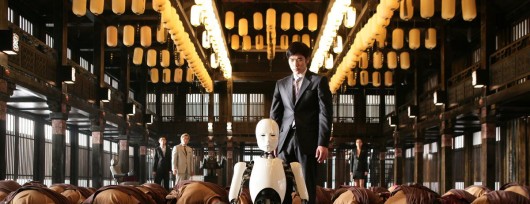Editor’s Note: This is the second part in a series about an expat mother’s experiences in Korea.
By Ms. V
You may remember that when I arrived in country I was 32 weeks pregnant, which should have meant I was giving birth about eight weeks after we arrived. Alas, I remained pregnant for ten weeks after our arrival, giving birth at nearly 42 weeks. It was June, in Seoul, hot and dusty as could be, and my belly just kept getting bigger and bigger. It was as if someone was sprinkling baby fertilizer on it while I slept. By 41+ weeks my doctor was beginning to contemplate ways to get things going, but thankfully, mercifully, the little one decided he was finally ready to face the world at 41 weeks, five days.
The morning that I went into labor began this way: breakfast, a brisk walk to the subway, a subway ride to my doctor’s office for a quick check-in, a snack, followed by a 2 hour walk to and around Montmartre Park, with innumerable stops to pee in the delightfully clean and free Seoul public toilets. All this time I was pretty sure labor had begun, but not quite. By the time we got home for lunch I was sure. I showered, ate, and plopped on the couch for my pre-planned early labor activity: movie watching. I watched Little Women, easily breathing through my contractions. I followed this up with Midnight in the Garden of Good and Evil, throughout which I had to concentrate to breathe through the contractions. By the time I got to L’Arnacoeur, I had to really focus to breathe through the birthing waves. (I would later ask myself why I waited to watch the subtitled film that I’d never seen before for last, when I was able to pay the least amount of attention. Fortunately, L’Arnacoeur, while a delightful comedic romp, has a predictable and easy-to-follow plot, even while laboring.)

I give you this brief synopsis to point out that, unlike what popular movies and media would have you believe, labor does not (usually) start in an instant with water gushing between a woman’s legs, her partner running around in a panic as he gathers suitcases, and both rushing off to the hospital while the woman screams in agony. Unfortunately this idea of labor and childbirth is pervasive in many parts of the world and Korea is no exception.

Now, before I go on I have to confess something: I gave birth naturally. I loved everything about my birthing experience, and while I stop short of being an advocate for natural birth, I am absolutely an advocate for mothers being the architects of their own birthing experience. Does this make me biased? Perhaps. My research and time spent with women who have given birth has led me to believe that whether or not a woman is satisfied with her birthing experience has more to do with how much she actively participated in her care than the actual way she gave birth.
The Korean approach to childbirth, much like pregnancy, is incredibly medicalized, and there is little to no concern for a mother’s satisfaction with the experience. Women are told, and therefore believe, that pregnancy should be treated like an illness and childbirth like a medical event. They are told that Asian women are less robust, if you will, than their European and African counterparts and therefore have a much harder time with pregnancy and childbirth.
If you tell a woman she is going to have a very difficult labor, she almost certainly will, and to look at the birth statistics in South Korea, you might believe it yourself. The rate of caesarean-section deliveries is among the highest in the world, a staggering 37%. It should be noted that a country like the United States, for example, has a very similar approach to childbirth and correspondingly similar statistics for c-section births. (33%) It should also be noted that both the US and South Korea have some of the worst numbers for infant and maternal mortality in the developed world. Contrast this with a place like the Netherlands, for example, where the c-section rate is at about 13% with the vast majority of births being handled by a midwife, many of them at home, and they have some of the world’s lowest infant and maternal mortality rates in the world.
So, depending on where you come from, you may find the Korean approach very familiar or completely foreign. Either way, you should be prepared. There are multiple factors at play when it comes to giving birth in a Korean hospital, not least of which is the relatively low status of women of child-bearing age and the high status of men and doctors. As such the pervading thought is that doctor knows best, not mother. Should you choose to birth in a Korean hospital you should be prepared to be told what will happen next, as opposed to being asked what you would like to have happen. You should also prepare for all of the “routine” interventions: artificial induction and/or enhancement of labor with pharmaceuticals, pre-set expectations for progress of cervical dilation and effacement, internal fetal monitoring, and restriction of food and water. If you are deemed strong enough, and your baby small enough, to deliver vaginally, you can also expect an episiotomy. If labor does not progress in the way your doctor would like it to, you are very likely to end up with a c-section.
It has not traditionally been common for Korean husbands to be with their wives during labor and delivery.This was also true of many western countries just 50 or 60 years ago and there was a recent discussion about it when the former president of France, Nicolas Sarkozy, missed the recent birth of his daughter. While some are of the opinion that mothers have an easier labor when their partners are present, other believe that the presence of the baby’s father can cause stress and anxiety in the laboring mother. I believe the nature of the relationship between the pair is what makes the difference. In a Confucian society like Korea where women are meant to be submissive to men and have very clear expectations heaped upon them in terms of behaviors and expression, it makes sense to me that women would labor better without their husbands present. In a relationship of equals, where each person sees the other as a partner, having the father present would most likely be preferred. Either way, if you are a foreigner birthing in a Korean hospital the staff will most likely expect the father to be present, as they are aware that this is customary in the west. If you are a foreigner and your partner is Korean, you may encounter some resistance, though I have heard that the best way to overcome this (assuming you both wish him to be present) is to say you need him as your translator.

The advice I have heard over and over from women who have birthed in Korea is to be confident and direct, but by no means aggressive, with your doctor and other birth attendants. Ask as many questions as you can beforehand so that you fully understand their standard procedures. Just as in many other places in the world, they will proceed as usual unless they asked otherwise. It is a very good idea to write a birth plan, have it translated into Korean, and insist as respectfully as you can that your doctor go over it with you.
If you really want a natural childbirth and an environment that supports that choice, you do have a few options. MediFlower Women’s Clinic & Natural Birthing Center is very popular with expats. The birthing center is quite beautiful and they have a very large birthing tub, with about a half dozen private birthing rooms. There is also a midwife named Rosa who has a clinic in Ansan. She will attend births both at home and in her clinic.
I loved everything about my birthing experience and even after 27 hours of active labor I can say that giving birth to my son was, by far, the best and most amazing thing I’ve ever done. One look into the eyes of your newborn and things like time and place lose all meaning. Giving birth far from your home and your own culture can have its challenges, but in those first precious moments holding your baby in your arms you will know the intense love and joy that has been felt by every mother in every country since time immemorial.

You’ll also likely be feeling relief, because, hey, you did it! You made a human! Well done. And, you’re not pregnant anymore! That’s pretty great. Enjoy those warm fuzzy feelings because as soon as you step outside with your bundle of joy you may also begin to feel something ranging from mild annoyance to outright rage as you are subjected to the thoughts, opinions, and prodding fingers of the most-likely-well-meaning-but-highly-intrusive-and-often feared Korean specimen: the ajumma.
More on that in Part III: The End is Just the Beginning
_________________________________________
 Ms. V lives in Seoul, South Korea with her spouse, their son, and three ferocious felines. She is a yoga teacher and a co-founder of Samdhana-Karana Yoga: A Healing Arts Center, a non-profit yoga studio in Tacoma, WA. While not marveling at her beautiful baby or doing yoga, she enjoys, writing, reading, and has dreams of one day sleeping again.
Ms. V lives in Seoul, South Korea with her spouse, their son, and three ferocious felines. She is a yoga teacher and a co-founder of Samdhana-Karana Yoga: A Healing Arts Center, a non-profit yoga studio in Tacoma, WA. While not marveling at her beautiful baby or doing yoga, she enjoys, writing, reading, and has dreams of one day sleeping again.
Ms. V keeps in touch with her students back in the States via the blog Body, Mind, Seoul and with perfect strangers via the blog I Don’t Know, where she ponders everything she doesn’t have an answer to – so a lot! She is also a contributing writer for World Moms Blog.
 Print This Post
Print This Post







